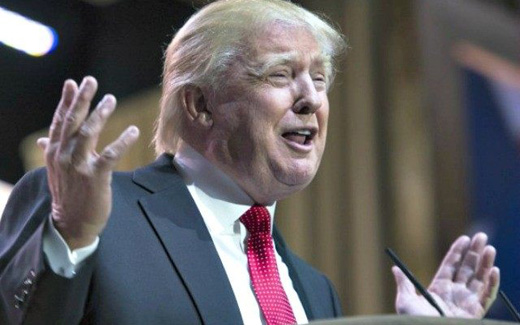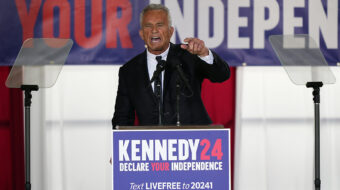
CHICAGO – We leftists have a script for arguing about elections. It goes something like this:
One of us strides to the footlights, throws up a fist, and proclaims that anyone who votes is a reformist, or an opportunist, or a politico-sexual deviant with masochistic tendencies.
And the rest of us laugh at that person, for being too young to vote or too old for that motorcycle jacket, and for thinking that boycotting an election is a real thing.
Then someone in a vest, or with historically accurate facial hair, assumes a dramatic pose and announces that never will they ever contemplate voting for [Democratic Party candidate]. Moreover, unless you support a third-party candidate, you aren’t even a real vegan.
Scattered applause. Someone attempts to start a “Jill… Stein… Jill… Stein!” chant, but it falls flat, and he pretends he has to take a phone call.
Finally, a venerable sage shuffles forward. They’ve been there and back again, and will speak counsel to the hotheads, the youth, the starry-eyed utopians. Their oracular message is this: [Democratic Party candidate] may not share our ideals, but only voting for [Democratic Party candidate] can advance the fight for equality and justice.
And so it goes, from age to age unchanging. The Théâtre de la Huchette, in Paris, has been performing the same two plays since 1957, but we could teach them a thing or two about sticking to a script.
And here we are, at it again. Primaries haven’t even begun yet, and we’re already barraged with “what ifs” and litmus tests, arguments about whether leftists can (should? must?) support a Clinton candidacy and social media sniping about who’s a “real” progressive or a “real” socialist.
These arguments aren’t just tiresome; they’re dangerous. They show an undemocratic way of thinking about elections, a politics of celebrity that focuses on people rather than issues.
They make us fight on enemy terrain.
Elections are easier to buy than social movements, so the ruling class tells us that elected leaders are the ones who count, the ones who do the work. That our role in a democracy is to vote every couple of years, then sit back and watch someone govern. That democracy means choosing the right person to sit at the fancy desk and be the decider.
Those of us on the left, who pontificate about democracy and should therefore know better, are not immune to this delusion. We persist in hanging our hopes on candidates, in framing our discussion of electoral issues around a name, even though we know that masses, not individuals, are the ones who make change.
Rahm Emanuel didn’t fire his police chief because he had a “road to Damascus” moment about racial justice. He did it because we knocked him on his ass with a runoff election and a mobilization against police violence.
The New Deal, the Civil Rights Act, the Affordable Care Act, withdrawal from Iraq: marches, sit-ins, teach-ins, editorials, resolutions. And, yes, elections. Struggle. Masses in motion, not leaders in isolation.
We should know better, but we get suckered into election analysis dominated by names and faces rather than movements and issues. We start talking about who we’re voting for rather than what we’re fighting for.
Electoral mobilization is a tactic, like a strike or a petition drive, but we treat elections as issues in themselves. We reframe our program in terms of what we can do for a candidate. We make it about winning an election, which has only a superficial relation to advancing an issue.
The 2016 elections have nothing to do with Trump vs. Sanders or Clinton vs. Rubio or Ted Cruz vs. Mechagodzilla. The names are just distractions. It’s about the same things it’s always about: income inequality, police brutality, jobs, deportations, defense spending, reproductive freedom, education, student debt, the environment, LGBTQ rights…
These are the issues, and electoral work is a powerful tactic for advancing them. It puts us in touch with new people, builds alliances, and offers vastly increased opportunities for education and ideological work.
And let’s not forget, in passing, that the people we elect make real decisions that help or hurt real people.
But let’s not make it personal.
It isn’t about Bernie or Hillary (or that other one). It isn’t about the decider at the fancy desk. It’s about a movement for justice that will, in a year, be surging, holding ground, or in a more or less disordered retreat based on the priorities of a new administration.
And when you go to the polls, remember, it isn’t about you, either. Don’t make the mistake of thinking that who you vote for determines what you fight for. It’s not about the person. It’s about the people.
Photo: AP

MOST POPULAR TODAY


Zionist organizations leading campaign to stop ceasefire resolutions in D.C. area

High Court essentially bans demonstrations, freedom of assembly in Deep South

Afghanistan’s socialist years: The promising future killed off by U.S. imperialism

Communist Karol Cariola elected president of Chile’s legislature






Comments